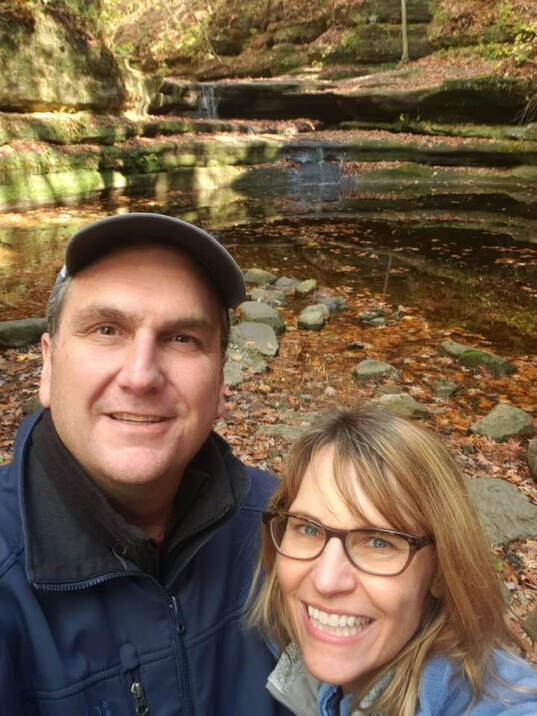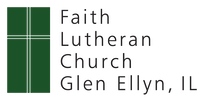Stories of Triumph and Inspiration
Members of Faith share personal experiences that highlight God's love, mercy and guidance.

Kathy Dibadj
Most of us identify our core identities by describing our jobs, professions or social roles. When asked about her daily life ministry, though, Kathy Dibadj responds differently: “I try to be kind, to relate to people.”
This is not a surprising answer, given her work as a certified school nurse—someone whose expertise combines medical know-how with understanding about learning and teaching. Someone who, you would think, whose job is to be kind, to relate to people. Someone who, like most of us, sees her work as a way to do good.
For Kathy, though, being kind and relating to people is not just being a nice person. There’s more. She has given this matter a lot of thought during her lifetime. The daughter of a Lutheran pastor, she learned an invaluable, enduring lesson early in her life:: “What we get from God we give to others; it’s about relationships. That’s the way you make a difference.”
If you ask her to say more about that, she tells you what good comes from those traits, those actions. “In today’s world, people are isolated—kids, too,” she notes. “If we can make people feel that they’re connected somehow, that can make a difference.” Still more: When she thinks that she could be the one who needs kindness on a particular day, she realizes that relationships filled with basic kindness “make people feel like they’re valuable, that they matter, that they’re worth being around.” And she knows that’s part of her basic calling as a follower of Jesus. “Jesus,” she reminds us, “wants us to have good relationships.”.
This core identity doesn’t stop with Kathy’s profession. Wherever she finds herself, she’s the kind of person who tries to soften the isolation we all feel. Here’s a perfect example: Standing in the line at the store—with heavy silence keeping people apart—Kathy finds small ways to offer effective prompts that bring others into conversations, helping them to feel good about themselves. An attitude as well as a skill, this bridging of awkwardness into relationship is something Kathy tries to bring to almost every personal encounter that comes her way.
Getting back to her role as a school nurse, which is another part of her lifework. When she was 3 years old, she watched as a hospital nurse helped her younger brother deal with the effects of spina bifida (a congenital defect of the spine). At that moment, Kathy knew. “That’s who I want to be.” She never veered from that thought.
Notably, Kathy has experienced a variety of nursing specialties in her career—pediatric, cardiology, home health, orthopedic and parish nursing. In her work now, she is part of the special education team at several local elementary schools. In that role, she adds health perspectives to the educational needs of children while, at the same time, getting to know the children and their parents. Further, as the acknowledged on-site “health expert”, she also extends her medical knowledge into her relationships with staff members at those schools—and especially with other school nurses.
Kathy is down-to-earth practical about the kindness-and-relationships thing. “It takes a year or two for people to realize and accept my kindness,” she says. In these times, “People are scared, worrying about what happens next.” In the context of the COVID epidemic, her work includes keeping track of the effects of this disease—contact tracing, being aware of child neglect, hunger, kids moving from school to school, poverty. She summarizes these conditions by saying, “Everyone has struggles. Everybody has hard things in their life that no one else knows about. I always try to remember that when I’m with others.”
In the months since the COVID pandemic, Kathy has noticed positive signs that give her hope. “I noticed this summer that kids were playing together,” she observes. Bike riding, lots of fishing around Lake Ellyn—spontaneous activities beyond their usual sports or hobbies. “Things they didn’t do in the past because they were too busy doing everything else.” Having fun and laughing together—"good for their souls because it keeps their brains off COVID.”
In the midst of all else that requires her attention, family is not overlooked by this wife and mother of three. It’s her family that keeps her going—her husband Tim, their college-age and post-college age children—as do the other nurses. So does being part of this congregation. “The difficulties we are facing have brought us to rely on each other more,” she says, echoing what so many of us are feeling right now.
Kathy Dibadj’s story illustrates how we can help each other through struggles—even the ones we don’t know someone is experiencing. In the end, as Kathy says, it’s the personal connections that make the difference in all areas of our lives—work, home, faith and community.
Most of us identify our core identities by describing our jobs, professions or social roles. When asked about her daily life ministry, though, Kathy Dibadj responds differently: “I try to be kind, to relate to people.”
This is not a surprising answer, given her work as a certified school nurse—someone whose expertise combines medical know-how with understanding about learning and teaching. Someone who, you would think, whose job is to be kind, to relate to people. Someone who, like most of us, sees her work as a way to do good.
For Kathy, though, being kind and relating to people is not just being a nice person. There’s more. She has given this matter a lot of thought during her lifetime. The daughter of a Lutheran pastor, she learned an invaluable, enduring lesson early in her life:: “What we get from God we give to others; it’s about relationships. That’s the way you make a difference.”
If you ask her to say more about that, she tells you what good comes from those traits, those actions. “In today’s world, people are isolated—kids, too,” she notes. “If we can make people feel that they’re connected somehow, that can make a difference.” Still more: When she thinks that she could be the one who needs kindness on a particular day, she realizes that relationships filled with basic kindness “make people feel like they’re valuable, that they matter, that they’re worth being around.” And she knows that’s part of her basic calling as a follower of Jesus. “Jesus,” she reminds us, “wants us to have good relationships.”.
This core identity doesn’t stop with Kathy’s profession. Wherever she finds herself, she’s the kind of person who tries to soften the isolation we all feel. Here’s a perfect example: Standing in the line at the store—with heavy silence keeping people apart—Kathy finds small ways to offer effective prompts that bring others into conversations, helping them to feel good about themselves. An attitude as well as a skill, this bridging of awkwardness into relationship is something Kathy tries to bring to almost every personal encounter that comes her way.
Getting back to her role as a school nurse, which is another part of her lifework. When she was 3 years old, she watched as a hospital nurse helped her younger brother deal with the effects of spina bifida (a congenital defect of the spine). At that moment, Kathy knew. “That’s who I want to be.” She never veered from that thought.
Notably, Kathy has experienced a variety of nursing specialties in her career—pediatric, cardiology, home health, orthopedic and parish nursing. In her work now, she is part of the special education team at several local elementary schools. In that role, she adds health perspectives to the educational needs of children while, at the same time, getting to know the children and their parents. Further, as the acknowledged on-site “health expert”, she also extends her medical knowledge into her relationships with staff members at those schools—and especially with other school nurses.
Kathy is down-to-earth practical about the kindness-and-relationships thing. “It takes a year or two for people to realize and accept my kindness,” she says. In these times, “People are scared, worrying about what happens next.” In the context of the COVID epidemic, her work includes keeping track of the effects of this disease—contact tracing, being aware of child neglect, hunger, kids moving from school to school, poverty. She summarizes these conditions by saying, “Everyone has struggles. Everybody has hard things in their life that no one else knows about. I always try to remember that when I’m with others.”
In the months since the COVID pandemic, Kathy has noticed positive signs that give her hope. “I noticed this summer that kids were playing together,” she observes. Bike riding, lots of fishing around Lake Ellyn—spontaneous activities beyond their usual sports or hobbies. “Things they didn’t do in the past because they were too busy doing everything else.” Having fun and laughing together—"good for their souls because it keeps their brains off COVID.”
In the midst of all else that requires her attention, family is not overlooked by this wife and mother of three. It’s her family that keeps her going—her husband Tim, their college-age and post-college age children—as do the other nurses. So does being part of this congregation. “The difficulties we are facing have brought us to rely on each other more,” she says, echoing what so many of us are feeling right now.
Kathy Dibadj’s story illustrates how we can help each other through struggles—even the ones we don’t know someone is experiencing. In the end, as Kathy says, it’s the personal connections that make the difference in all areas of our lives—work, home, faith and community.
